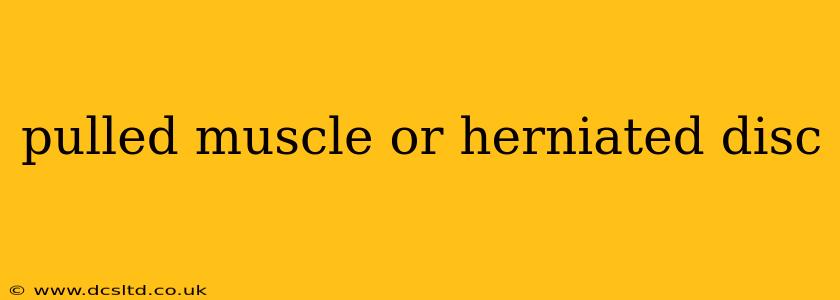Experiencing lower back pain? It's a common problem, but determining the cause—a pulled muscle or a herniated disc—is crucial for effective treatment. This comprehensive guide will help you understand the key differences between these two conditions, allowing you to better communicate with your doctor and find the right path to recovery.
What is a Pulled Muscle (Muscle Strain)?
A pulled muscle, more accurately termed a muscle strain, occurs when muscle fibers are overstretched or torn. This often happens during strenuous activity, sudden movements, or repetitive motions. The severity of a muscle strain can range from mild discomfort to severe pain, limiting your ability to move. Common symptoms include:
- Localized pain: The pain is typically concentrated in the affected muscle.
- Muscle spasm: Involuntary muscle contractions can exacerbate the pain.
- Swelling: Inflammation may occur around the injured area.
- Limited range of motion: You might find it difficult to bend, twist, or lift.
- Tenderness to the touch: The affected muscle feels sore when touched.
What is a Herniated Disc?
A herniated disc, also known as a slipped or ruptured disc, occurs when the soft, gel-like center of an intervertebral disc pushes through a tear in the tougher outer layer. This can put pressure on nearby nerves, causing pain that radiates down the leg (sciatica) or elsewhere in the body. Symptoms often include:
- Radiating pain: Pain that travels down one leg or arm, often following the path of a nerve.
- Numbness or tingling: A loss of sensation in the affected limb.
- Weakness: Difficulty lifting or moving the affected limb.
- Sciatica: Severe pain radiating down the leg, often accompanied by numbness and tingling.
- Back pain: While not always present, back pain can be a significant symptom.
Pulled Muscle or Herniated Disc: How Can I Tell the Difference?
Differentiating between a pulled muscle and a herniated disc can be challenging, as both conditions can present with similar symptoms. However, key distinctions exist:
- Location of Pain: Pulled muscle pain is typically localized to the affected muscle group, while herniated disc pain often radiates down the leg or arm.
- Nerve Involvement: Herniated discs usually involve nerve compression, leading to numbness, tingling, and weakness. Muscle strains rarely cause these neurological symptoms.
- Onset: Muscle strains often occur after a specific event, like a sudden movement. Herniated discs may develop gradually or suddenly.
- Intensity: While both can cause severe pain, herniated disc pain is often more intense and persistent.
How Are Pulled Muscles and Herniated Discs Diagnosed?
Your doctor will conduct a physical exam, assessing your range of motion, reflexes, and muscle strength. Imaging tests like X-rays, MRIs, or CT scans might be necessary to confirm the diagnosis and rule out other conditions.
How are Pulled Muscles and Herniated Discs Treated?
Treatment for both conditions typically involves conservative approaches:
- Rest: Avoiding activities that aggravate the pain.
- Ice and heat: Applying ice initially to reduce swelling, followed by heat to relax muscles.
- Over-the-counter pain relievers: Ibuprofen or acetaminophen can help manage pain and inflammation.
- Physical therapy: Strengthening and stretching exercises can help improve muscle function and flexibility.
For herniated discs, additional treatment options may include:
- Epidural steroid injections: To reduce inflammation and pain.
- Surgery: In severe cases that don't respond to conservative treatment.
What are the Long-Term Prognosis for Pulled Muscles and Herniated Discs?
Most pulled muscles heal within a few weeks with proper rest and treatment. Herniated discs can take longer to heal, and some individuals may experience ongoing pain. However, many people with herniated discs improve significantly with conservative treatment.
Can a Pulled Muscle Lead to a Herniated Disc?
While not directly causing a herniated disc, repeated muscle strains or injuries in the back can contribute to the gradual degeneration of the intervertebral discs, potentially increasing the risk of herniation over time.
How long does it take for a pulled muscle to heal?
The healing time for a pulled muscle varies depending on its severity. Minor strains may heal within a few days to a week, while more severe strains can take several weeks or even months.
How long does it take for a herniated disc to heal?
Recovery from a herniated disc varies significantly. Some individuals may experience significant improvement within a few weeks, while others may have ongoing pain and require longer-term management. Complete healing can take several months, or even longer in some cases.
This information is for general knowledge and does not constitute medical advice. Always consult a healthcare professional for diagnosis and treatment of back pain. They can accurately assess your specific condition and recommend the most appropriate course of action.
